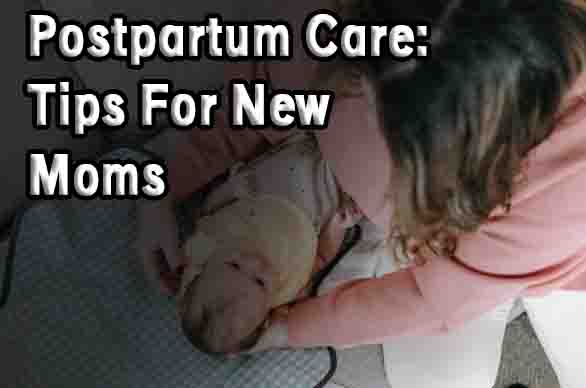You just delivered your perfectly healthy baby, and all the knowledge you absorbed reading hundreds of articles, books, and magazines has come in handy. Well, now what? You know all about your baby, their health, the do’s and don’ts, but what about you? What about your health? You must take care of yourself first to take care of the baby.
It’s okay. There’s no need to panic now. It’s common for mothers to be fully invested in their baby’s health that they often forget about their own.
Worry not! We’ve got you all covered! Having a healthy postpartum period is extremely necessary, not just for the mother, but also for the family’s health and happiness. Here’s what you need to know:
Table of Contents
Things to keep in mind first
Before we dive in, let’s make sure your baby is completely fine so you can eliminate a fraction of your worries from your mind. Don’t be scared if the baby seems blueish at first. It’s only going to be temporary. The hospital will conduct many tests, including APGAR (appearance, pulse, grimace, activity, and respiration).
However, you need to ensure your baby has no brachial plexus injuries. They are often caused by doctors who use excessive force to pull out the baby during a complicated delivery. This leads to babies developing medical conditions like Erb’s palsy that have life-long repercussions for the child and the family. In this case, you need to contact the Erbs palsy attorneys right away. Lawyering up will help you secure compensation for your child’s future treatment.
Once you’ve made sure you child is healthy, focus on your health. Here are some tips for all the new moms concerned about their postpartum care.
1. Adjust and heal yourself
How can you cope with your body undergoing a 360-degree change during and after pregnancy? Like every other thing, it’s not simple. Whether after a vaginal delivery or a cesarean section, every mother goes through different postpartum challenges and recovery paths. You can deal with them by following a few simple tips.
- Pelvic floor changes: the vagina and perineum stretch or are often cut by the doctor during delivery. Doing Kegel exercises, sitting on a pillow, or icing the area with an ice pack covered in a towel can help the area get back in shape and strengthen the pelvic muscles.
- Vaginal discharge and soreness: icing and sitting on a pillow/padded ring can help with the soreness. Do not use warm water while urination, as it can cause perineum irritation. It is normal for your vagina to discharge tissue and blood from the uterus for up to two to four weeks. Consult your doctor if the bleeding is heavy, forcing you to change your sanitary napkins every two hours.
- Tender breasts: your breasts will swell up and fill with milk for breastfeeding. This engorgement can be quite painful. Gentle massages, cold/warm compresses, and frequent breastfeeding can help relieve the pain. Nipple cream will help eliminate the cracking and soothe the pains.
- Uterine pains: ask your doctor to prescribe pain medications for the cramping caused by the shrinking uterus.
- Constipation: consume fiber-rich foods, plenty of water, and prescribed medicines to help with constipation. A sitz bath can also help reduce anal swelling and hemorrhoids.
- C-Section scar: in case of a C-section, ask your doctor to prescribe an antibiotic ointment to clean your scar.
2. Rest, rest, and rest
The three-word emphasis depicts that it is the most important thing for your health! Your baby is cute, and it is understandable that you can’t get enough of it. But you must get enough rest—both physically and mentally.
There’s little to no need to worry about doing additional chores around the house. You already have a lot on your plate – feeding your baby, changing diapers, keeping up with abdominal pains, and taking care of your health. So ask your partner to help you out with work at home or seek other family members’ help.
3. Take care of your baby blues and postpartum depression
Almost 70 to 80% of new moms go through negative feelings and mood swings. Caused by hormonal changes in your body, baby blues can start a few days after delivery and go up to two weeks. Don’t worry if you experience sadness, irritability, unexplained crying, mood swings, insomnia, or restlessness. It’s part of the deal.
Postpartum depression, however, stays for more than two weeks and can even last for years. Symptoms include losing interest in the baby and other activities, withdrawing from people close to you, feeling worthlessness, guilt, and sometimes thoughts of hurting the baby. It is best to seek medical treatment or find ways to overcome this phase as soon as possible.
4. Rev up your engine
Though sitting, sleeping, and resting may be all you want to do, moving your body and exercising are beneficial postpartum. You can start revving up your engine a few days after delivery, but it’s better to consult your doctor before doing so.
5. Keep eating
Keeping your health a priority is a must-do. Consume healthy food, including fruits, vegetables, whole grains, protein, and vitamins, and take in lots and lots of fluids, especially while breastfeeding your baby. Cutting down on caffeine, sugar, and alcohol is as important. A healthy diet can eliminate constipation, fatigue, and extra weight.
6. Visit your doctor regularly
Keep up with your regular check-ups! An initial assessment within three weeks postpartum is advised to treat any acute problems. A follow-up visit after 12 weeks will help conclude the complete check-up procedure. Seek immediate guidance if you find anything problematic.
Conclusion
Giving birth isn’t easy, and keeping up after that isn’t either. Treating postpartum depression is essential since it can ruin your life as well as your child’s and family’s. Use the tips mentioned in this article to look after yourself. Your newborn’s well-being depends on yours.

